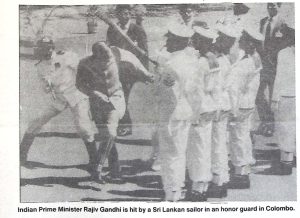
NEW DELHI, India: A Sri Lankan honor guardsman clubbed the Indian Prime Minister Rajiv Gandhi with an unloaded rifle Thursday during a ceremony at the Presidential Palace in Colombo.
Gandhi, who ducked and fended off the blow, said he suffered only “a lump” on one shoulder.
The attack occurred in the Sri Lankan capital as Gandhi reviewed 72 white uniformed sailors before returning to New Delhi. The Sinhalese assailants apparently was incensed at the previous day’s signing of an Indian brokered peace pact designed to end Sri Lanka’s four year old civil war between the island’s Sinhalese majority and Tamil guerrillas.
The United News of India news agency called it an “assassination attempt”, but Gandhi declined to endorse that interpretation, telling journalists they could decide for themselves what to call it .
Gandhi, who ducked and held up his arms for protection, told reporters on the plane home: “It was something. I was clobbered on the left shoulder”.
Many Sri Lankan Sinhalese have been enraged by India’s support for Tamil militants.
Tamils, most of whom are Hindus like the vast majority of Indians, form 18 percent of Sri Lanka’s population of 16 million. They say they are discriminated against by the Sinhalese Buddhists, who control the government and the armed forces.
Sri Lankan authorities are investigating whether the sailor who assaulted visiting Indian Prime Minister Rajiv Gandhi has any connections with an outlawed leftist group, security sources said today.
Wijeyemunige Rohana De Silva, 22, a member of a naval honor guard, swung his rifle by the barrel at Gandhi and hit him with the butt on the back of the head, neck and left shoulder.
The sailor was overpowered by two naval officers while Gandhi’s security men swiftly moved him to safety watched by a stunned audience comprising Sri Lankan President Junius Jayewardene, Ministers, diplomats and journalists.
The sources said investigators from the navy and the criminal investigation department were making inquiries at De Silva’s home at Boosa.
They said his brother has a private in the army and his sister a recent recruit to the air force.
Boosa, a small town 110 km (65 miles) south of Colombo, is 4 stronghold of the Janatha Vimukthi Peramuna (People’s Liberation Front) blamed last night by Jayewardene as being partly responsible for the revolt against the ethnic peace accord he and Gandhi signed on Wednesday.
Indian High Commission Jyotindra Nath Dixit said officers of Gandhi’s security staff were allowed by the Sri Lankan government yesterday to meet the assailant and question him.
Dixit said he expected Indian authorities to be involved in interrogation of the sailor.
Sri Lanka’s state television said leftists dropped by helicopters in Jaffna called for the surrender of all types of arms, ammunition, communication equipment, military uniforms and equipment used in arms manufacturing. It said the Tamil rebels would hand over their arms in eight northern and eastern districts. Under the controversial peace agreement, there would be a ceasefire within 48 hours of signing.
It also provides for the surrender of arms by Tamil rebels and the confinement of troops in their barracks within 72 hours by Monday — from the time the ceasefire takes effect. There were no immediate reports on whether there was opposition to the Indian troops by the Tigers, the main group fighting for a Tamil homeland.
The LITE has not formally accepted the agreement and Dixit said Gandhi was expected to meet its leader, Vellupillai Prabhakaran, either today or tomorrow.
Dixit said the Indian solidest, who arrived with their own weaponry, vehicles and equipment, will remain in the island until peace is restored.
He said more troops will come “so the situation requires” but he did not elaborate. Officials said Indian aircraft yesterday transported’ 600 Sri Lankan troops from the northern province to Colombo to help curb two days of rioting in and around the capital.
Jayewardene last night blamed the banned Janatha Vimukthi Peramuna (JVP: People’s Liberation Front), for the violence. The JVP, an Marxist group, staged an uprising in 1971 to topple the government then Prime Minister Sirima Bandaranaike, who now leads the Opposition to the agreement signed with Gandhi.
Article extracted from this publication >> August 7, 1987